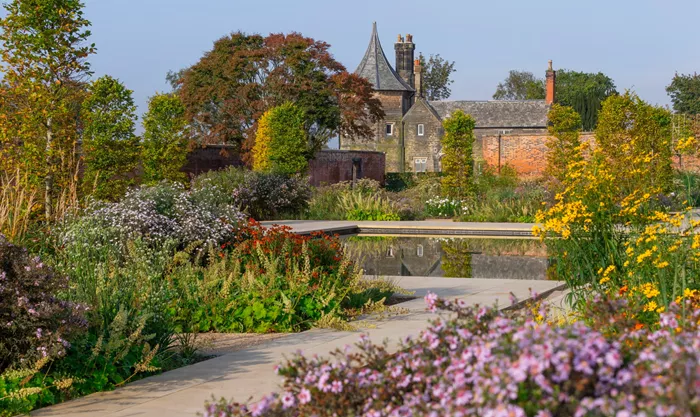The climate is significantly impacting British gardens, according to a new report from the Royal Horticultural Society (RHS). Researchers have modeled the effects of global warming on RHS properties through 2075, revealing that summers will be hotter and drier across most of the UK, with Manchester being the exception.
Greater Manchester’s reputation as a rain-prone area, highlighted by a dedicated website called Rainchester, means that the RHS Bridgewater garden in Salford will focus on species that thrive in cooler, wetter conditions. Traditional trees such as oaks, birches, and beeches—once staples of the British landscape—are struggling in southern England. As a result, they are being considered for inclusion in the new arboretum at RHS Bridgewater, which aims to preserve a diverse range of species.
This garden is expected to serve as an oasis compared to the changing climate affecting the rest of the UK. Home gardeners are already adapting to more extreme weather patterns. Sales of water butts and greenhouse shades have surged this year, even with a less-than-ideal summer.
Hartley Botanic, a greenhouse manufacturer, reported a 30% increase in greenhouse blind sales and a rise in water butt purchases. CEO Tom Barry noted that customers are adapting to increasingly extreme weather conditions.
Other independent suppliers, such as Marshalls Garden, Enviroblinds, and De Leuw, also reported sales increases. B&Q observed a growing number of searches for items like parasols, water butts, bark chippings, and mulch on its website.
Despite this summer being the coolest since 2015, the Met Office reported that temperatures would still be considered above average compared to 1961-1990. Although wet weather disrupted many summer holidays, overall rainfall was 5% below average.
In Greenwich, the Royal Park suffered from dryness during the August 2022 heatwave. The RHS manages five gardens across England to sustain plant species in various climates. Jon Webster, curator of RHS Rosemoor in Devon, explained that they have projected changes in temperature and rainfall until 2075.
“Most of our gardens are experiencing hotter, drier summers,” Webster said. “RHS Bridgewater is the only garden that has remained relatively stable in its climate. It has taken the title of the wettest garden from us.”
The four other RHS gardens have already seen a decline in moisture. Plant collections, including 130 rhubarb varieties, rhododendrons, and gooseberries, have been relocated north to Bridgewater from RHS Wisley in Surrey.
New arboretums are planned for Bridgewater and RHS Hyde Hall in Essex, marking a significant initiative for the RHS, which last planted an arboretum at Rosemoor 25 years ago.
Webster mentioned that species such as oaks, once not considered viable for an arboretum in the UK, are now becoming contenders due to the changing climate. He also noted that birches and beeches are struggling, while more exotic species like Magnolia grandiflora from the southern US are thriving at Wisley.
“Birches have beautiful bark and are a desirable feature in landscapes,” Webster said. “However, in the southeast, they are not coping well with the hotter weather, especially the Himalayan birch, which is shedding leaves early.” More trees are also showing signs of distress, with many developing stag-heads, which means they are dying back and leaving only their upper branches.
While domestic gardeners are turning to water butts, the RHS is undertaking larger projects, such as creating a new reservoir from a disused canal and lime kiln at Rosemoor. Additionally, Wisley has introduced a new lake that collects rainwater.
The RHS is also employing gator bags—devices that slowly drip water at the base of young trees—and promoting tight planting to reduce exposed soil and retain moisture. Providing shade for greenhouse plants is essential, achieved through thermal screens or by whitewashing glass.
“Harlow Carr in Harrogate has a remarkable alpine house, but they are finding summer temperatures too extreme,” Webster explained. “As a result, they have introduced cacti and succulents, which would not have thrived a decade ago. We must constantly reevaluate our collections and adapt, and this should also apply to domestic gardeners.”
Related topics:
- How to Keep Your Bouquets Fresh and Lasting Longer
- Simple Pruning Tips for Abundant Rose Blooms: Avoid Common Mistakes That Can Kill Flowers
- Gardening Expert’s Tip for Keeping Outdoor Flowers Warm in Cold Weather


